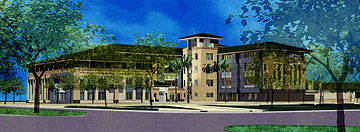 COURTESY
A NEW HALL OF JUSTICE FOR KAPOLEI
The planned complex will include:
» A four-story, 123,118-square-foot courthouse with one large courtroom and 12 smaller nonjury courtrooms
» A one-story, 52,306-square-foot juvenile detention facility to include 66 beds
» 10.97 acres donated by the Estate of James Campbell in the Kapolei Civic Center
» 394 parking spaces (212 for public use)
» Estimated project cost: $124,445,000
» Contractor: Unlimited Construction Services Inc.
» Completion date: 2009
CLICK FOR LARGE
|
|
Kapolei court complex site blessed and condemned
An official with a section of the Hawaii State Bar Association opposed the location of the new Kapolei Courthouse Complex yesterday, citing traffic and an increase in legal fees to cover transportation costs.
"Our position is it's not fair for the people who live in Honolulu, Kakaako, Waikiki and Waimanalo to have to drive out to Kapolei," said Adrienne King, chairwoman of the Family Law Section of the Bar Association.
King's comments came in a telephone interview after a groundbreaking ceremony yesterday on the future site of the courthouse complex at 4675 Kapolei Parkway, at Kamokila Boulevard and Kapolei Parkway.
Court officials have long said the new complex will move toward providing adequate court services for families.
A traditional Hawaiian blessing took place with members of the Royal Order of Kamehameha I in attendance.
Lt. Gov. James "Duke" Aiona, Mayor Mufi Hannemann, Honolulu Police Chief Boisse Correa, Honolulu Fire Chief Kenneth Silva, area representatives and community leaders were among the estimated 150 people who attended yesterday's event.
State Supreme Court Chief Justice Ronald Moon, among those who spoke during the ceremony, called the courthouse complex a dream realized.
During the late 1980s, former Chief Justice Herman Lum had a vision of the courthouse. Moon carried on his vision and persisted over the years to seek funding from the Legislature.
Initial funding was provided by the Legislature in 1989. In 2005, $95 million was appropriated to the Judiciary for the courthouse complex, with another $25.2 million appropriated in this year's legislative session. The estimated cost of the project is $124.4 million.
"I'm just very elated and proud to have been part of bringing about the dream, the fulfillment of Chief Justice Lum's dream," Moon said yesterday.
Courtrooms and waiting rooms at the complex will be much larger than the rooms at the current site on the second floor of Circuit Court on Punchbowl Street.
Officials have been concerned about crowded conditions in waiting rooms. "This is what happens when you have these crowded waiting rooms with the victims sitting with the defendants and the witnesses. You can imagine how high the anxiety level can go," he added.
A new secure juvenile detention facility will be built next to the courthouse complex. The detention facility on Alder Street, built during World War II, will still be used for juvenile-related services, Moon said.
It is Moon's plan that all Family Court matters will be conducted at the new complex. There will still be some services provided at the Honolulu court, he said. "We haven't determined specifically what kind of services, but we have set aside five courtrooms to be there in Honolulu."
 CRAIG T. KOJIMA / CKOJIMA@STARBULLETIN.COM
Participants prepared yesterday for groundbreaking for the long-awaited Family Court building in Kapolei. State Supreme Court Chief Justice Ronald Moon, fifth from left, who was instrumental in getting the new court, participated in the ceremony. CLICK FOR LARGE |
|
A Judiciary spokeswoman contacted last night said she did not have adequate time to respond to King's criticisms.
King said it would be more cost-efficient if the Judiciary split Oahu into two judicial circuits. With the current plan, individuals on Leeward Oahu still have to commute to Honolulu for criminal, civil and traffic cases.
King said about 2,700 Family Court users were involved in a 1998 survey that concluded that "a significant number of users would have moderate to very difficult time getting to Kapolei because of place of residence, work schedule, place of work, school schedules for children and transportation obstacles."
The survey also concluded that the "poorest patrons would be affected due to the transportation."
"When you're talking about the poorest, you're talking about the people in Honolulu, which is the urban core, who will already be challenged in paying for attorneys and for getting to court," King said.
There's a misconception that family law attorneys do not want to make the commute from Honolulu to Kapolei, she added. "The lawyers will drive wherever they get paid to go."

